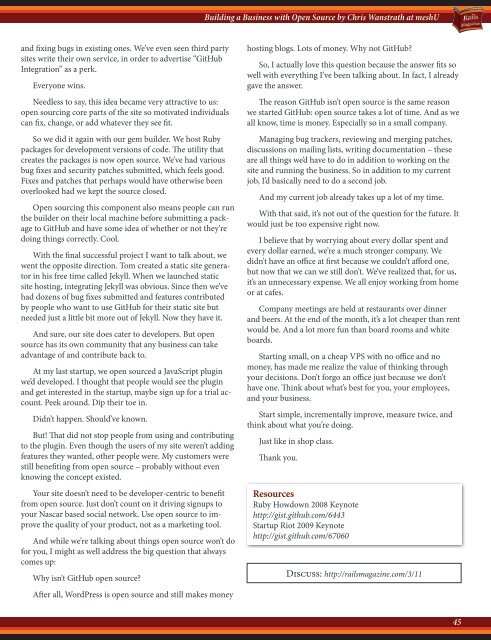Rails Magazine - Issue 3
Rails Magazine - Issue 3
Rails Magazine - Issue 3
Create successful ePaper yourself
Turn your PDF publications into a flip-book with our unique Google optimized e-Paper software.
and fixing bugs in existing ones. We’ve even seen third party<br />
sites write their own service, in order to advertise “GitHub<br />
Integration” as a perk.<br />
Everyone wins.<br />
Needless to say, this idea became very attractive to us:<br />
open sourcing core parts of the site so motivated individuals<br />
can fix, change, or add whatever they see fit.<br />
So we did it again with our gem builder. We host Ruby<br />
packages for development versions of code. The utility that<br />
creates the packages is now open source. We’ve had various<br />
bug fixes and security patches submitted, which feels good.<br />
Fixes and patches that perhaps would have otherwise been<br />
overlooked had we kept the source closed.<br />
Open sourcing this component also means people can run<br />
the builder on their local machine before submitting a package<br />
to GitHub and have some idea of whether or not they’re<br />
doing things correctly. Cool.<br />
With the final successful project I want to talk about, we<br />
went the opposite direction. Tom created a static site generator<br />
in his free time called Jekyll. When we launched static<br />
site hosting, integrating Jekyll was obvious. Since then we’ve<br />
had dozens of bug fixes submitted and features contributed<br />
by people who want to use GitHub for their static site but<br />
needed just a little bit more out of Jekyll. Now they have it.<br />
And sure, our site does cater to developers. But open<br />
source has its own community that any business can take<br />
advantage of and contribute back to.<br />
At my last startup, we open sourced a JavaScript plugin<br />
we’d developed. I thought that people would see the plugin<br />
and get interested in the startup, maybe sign up for a trial account.<br />
Peek around. Dip their toe in.<br />
Didn’t happen. Should’ve known.<br />
But! That did not stop people from using and contributing<br />
to the plugin. Even though the users of my site weren’t adding<br />
features they wanted, other people were. My customers were<br />
still benefiting from open source – probably without even<br />
knowing the concept existed.<br />
Your site doesn’t need to be developer-centric to benefit<br />
from open source. Just don’t count on it driving signups to<br />
your Nascar based social network. Use open source to improve<br />
the quality of your product, not as a marketing tool.<br />
And while we’re talking about things open source won’t do<br />
for you, I might as well address the big question that always<br />
comes up:<br />
Why isn’t GitHub open source?<br />
After all, WordPress is open source and still makes money<br />
Building a Business with Open Source by Chris Wanstrath at meshU<br />
hosting blogs. Lots of money. Why not GitHub?<br />
So, I actually love this question because the answer fits so<br />
well with everything I’ve been talking about. In fact, I already<br />
gave the answer.<br />
The reason GitHub isn’t open source is the same reason<br />
we started GitHub: open source takes a lot of time. And as we<br />
all know, time is money. Especially so in a small company.<br />
Managing bug trackers, reviewing and merging patches,<br />
discussions on mailing lists, writing documentation – these<br />
are all things we’d have to do in addition to working on the<br />
site and running the business. So in addition to my current<br />
job, I’d basically need to do a second job.<br />
And my current job already takes up a lot of my time.<br />
With that said, it’s not out of the question for the future. It<br />
would just be too expensive right now.<br />
I believe that by worrying about every dollar spent and<br />
every dollar earned, we’re a much stronger company. We<br />
didn’t have an office at first because we couldn’t afford one,<br />
but now that we can we still don’t. We’ve realized that, for us,<br />
it’s an unnecessary expense. We all enjoy working from home<br />
or at cafes.<br />
Company meetings are held at restaurants over dinner<br />
and beers. At the end of the month, it’s a lot cheaper than rent<br />
would be. And a lot more fun than board rooms and white<br />
boards.<br />
Starting small, on a cheap VPS with no office and no<br />
money, has made me realize the value of thinking through<br />
your decisions. Don’t forgo an office just because we don’t<br />
have one. Think about what’s best for you, your employees,<br />
and your business.<br />
Start simple, incrementally improve, measure twice, and<br />
think about what you’re doing.<br />
Just like in shop class.<br />
Thank you.<br />
Resources<br />
Ruby Howdown 2008 Keynote<br />
http://gist.github.com/6443<br />
Startup Riot 2009 Keynote<br />
http://gist.github.com/67060<br />
Discuss: http://railsmagazine.com/3/11<br />
45<br />
45


